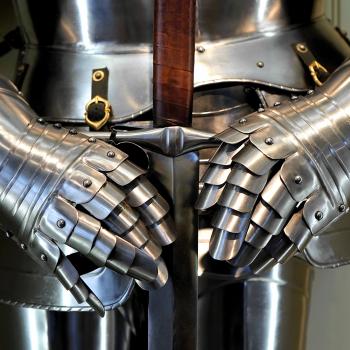To Train Up a Child, Chapter 5, Part 2
Here we learn more about Michael’s conception of God.
4. UNDERSTANDING THE CHARACTER OF GOD
The parent who excuses himself from using the rod based on an excuse of loving the child too much does not well understand the character and methods of God toward His own people.
There is a current thought pattern that has edged into the Christian’s thinking. It goes something like this: “Since God is love, He is not discriminating, demanding, vindictive, or vengeful.” Essentially, they view the love of God as incompatible with the justice of God. It seems to them that He must be either one or the other. There is a vague, undefined sense that God was once vengeful, but is now passive, tolerant and ecumenical—the Universal Father. God is stripped of His balanced personality and defined in a non-threatening way. Heaven is well received; hell is suspect. “Judge not,” the most popular verse in the Bible, is quoted as if God Himself could no longer discriminate between right and wrong. As much as God is love, so much is he holy, just, judgment and truth. It is out of His love of righteousness that He is coming in “flaming fire taking vengeance on them that know not God, and that obey not the gospel of our Lord Jesus Christ (2 Thes. 1:8).” To choose one side of God’s character as a model for our actions, while rejecting the other, can hardly be called virtue.
This is all standard fare I heard growing up, and is probably preached in just about every evangelical and fundamentalist church in the country. Progressive Christians emphasize God’s love above all else, but evangelicals and fundamentalists insist on balancing God’s love with what they call “justice.” And therein lies the problem, because apparently “justice” means being vengeful and even wrathful. And just what is “love,” in this context? And why does “justice” include an almost vindictive level of wrath? We today only execute the most egregious offender, and yet Michael’s God punishes the smallest slight with eternal torture. That’s not justice—and it’s certainly not love! Of course, all of this could fill numerous blog posts, so we’re going to move on with just this introduction.
GOD SPANKS HIS CHILDREN
Yes, this is actually Michael’s heading.
Those who out of a magnanimous sense of righteousness choose not to use the rod are, by inference, condemning God. “For whom the Lord loveth he chasteneth, and scourgeth every son whom he receiveth. If ye endure chastening, God dealeth with you as with sons; for what son is he whom the father chasteneth not? But if ye be without chastisement, whereof all are partakers, then are ye bastards, and not sons (Heb. 12:6-8).”
Then it says He chastens us “for our own profit, that we might be partakers of his holiness (Heb. 12:10).” A most profound statement! God does not have any sons who escape chastisement—“all are partakers.” And, did He stop loving those whom he chastened? Quite the contrary, love was His motivation for the “spanking.” Only through chastisement, could His sons fully partake of His holiness. He does it “for our own profit.”
“No chastening for the present seemeth to be joyous, but grievous… (Heb. 12:11).” God’s chastisement is a painful “whipping.” Our “fathers of the flesh . . . chastened us after their own pleasure… (12: 9, 10).” The Scripture not only condones physical “scourging,” but promotes it as a means to holiness—when ministered for the son’s “profit.”
The chastisement is represented as a sure sign of love: “for whom the Lord loveth, he chasteneth. ” If there is no chastisement, it is not only an indication of not being loved, but of being a “bastard” So we see that out of the very love of God springs chastisement. Thus, our original passage in Prov. 13:24, “He that spareth his rod hateth his son: but he that loveth him chasteneth him betimes. ”
If God’s love is expressed by the “whippings” He gives, then can we not love our children enough to chasten them unto holiness? I have heard a rebellious teenager say, “If they only loved me enough to whip me.”
And these are the moments where I want to rage quit this review series. What even is this?! Michael’s idea of love is severely twisted. According to Michael, parents show their love for their children by giving them “whippings.” This is totally sick. And notice, it’s more of what I’ve noted before—telling parents that God has told them to beat their children, and that if they don’t, they are not only not loving God but also “condemning God.” I mean, Michael is basically telling evangelical and fundamentalist parents that if they don’t beat their children, they (and their children) will go to hell.
As a side note, if you want some background on how Christian advocates of “gentle discipline” interpret this passage of Hebrews 12, see Dulce’s blog or Gentle Christian Mothers. In a nutshell, this passage was written to encourage Christians who were being persecuted, not as some sort of child rearing prescription. But of course, Michael’s interpretation of the Bible doesn’t allow for nuance. Michael reads this passages and sees not words meant to encourage persecuted Christians but rather the short outline for his child discipline manual.
I’ve noticed that when he talks to reporters, Michael frequently downplays the level of discipline he advocates. But here in his own book, he flat out advocates “whipping” children. And do you remember the other week when Michael wrote about obeying his father not out of fear of punishment but because he wanted to please him? Yeah, no. When we bring “whipping” into the question, fear of punishment will always be present—very present.
Recently, a mother told us that after cracking down on her children with a consistent use of the rod, one child thanked God for making his Mama sweeter. The increased spankings had reduced disobedience, causing the child to be more in harmony with his mother. He interpreted this to be a sweeter mother.
Michael makes me want to bang my head against a wall on a regular basis. Is the goal a compliant child? Really? Not a compassionate, confident, creative, and curious child? Just a compliant child? And does Michael really think that beating a child is the only way to make a home run more smoothly—as opposed, say, to communicating with the child and teaching the value of cooperation and compromise? Or even, say, as opposed to gently enforcing boundaries through positive reinforcement and considering the needs and limits of the child? Is Michael so limited that his go to advice is “the beatings will continue until the morale improves”? Really?
And yet this man has his followers convinced he’s an expert on child training and child psychology.














